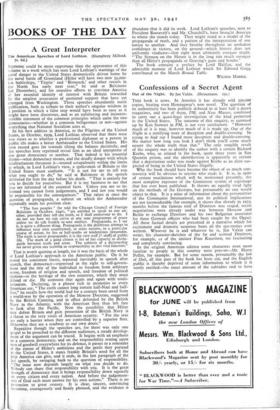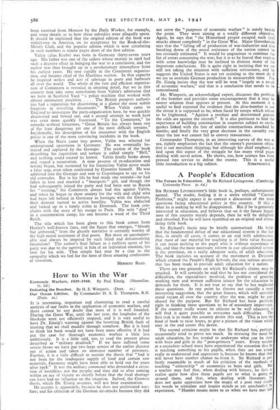Confessions of a Secret Agent
Out of the Night. By Jan Valtin. (Heinemann. t5s.) THIS book is news. In America it has already sold 350,000 copies, beating even Hemingway's new novel. The question of its authenticity has been publicly debated in at least half a dozen magazines, and two of them, PM, and New Masses, combined to carry out a quasi-legal investigation of the kind permitted in the United States. The outcome of this enquiry, as summed up by Ken Stewart in PM, is not very satisfactory. " However much of it is true, however much of it is made up, Out of the Night is a terrifying story of deception and double-crossing. In trying to find out I found more deception and double-crossing. No matter how long you look I don't think you'll come much nearer the whole truth than that." The only tangible result of the enquiry was to identify the author with a certain Richard Krebs, who, as related in the book, spent three years in San Quentin prison, and the identification is apparently so certain that a deportation order was made against Krebs as an alien sus- pected of being in the United States illegally.
Why the book should have become the object of so much con- troversy will be obvious to anyone who reads it. It is, in spite of certain mutilations which will be mentioned presently, the most complete exposure of the Comintern system of espionage that has ever been published. It throws an equally vivid light on the methods of the Gestapo, but presumably no one would object to that. It is a mine of information about the personalities of the Communist International, and its political implications are not inconsiderable (for example, it shows that already in 1933, months before the famous trial of Dimitrov was staged, secret negotiations were already under way between Moscow and Berlin to exchange Dimitrov and his two Bulgarian associates for three German officers who had been caught by the Ogpu). All these factual details are presented in a narrative which for excitement and dramatic suspense beats all the spy-stories ever written. Whoever he is and whatever he is, Jan Valtin can write; his character-sketches of the fat and scented Dimitrov, for example, Gr of the sinister Finn Kuusinen, are fascinating and completely convincing. In the original American edition some characters even more familiar to people in this country were presmt—Mr. Harry Pollitt, for example. But for some reason, presumably the law of libel, all this part of the book has been cut, and the English public is thereby deprived of some information to which it is surely entitled—the exact amount of the subsidies said to have
been received from Moscow by the Daily Worker, for example, and some details as to how these subsidies were allegedly spent. It should be explained that the original edition of the book was withdrawn in America, on its acceptance by the Book-of-the- Month Club, and the popular edition which is now circulating in such numbers is ninety pages short of the first edition.
Valtin (alias Krebs) was born in Germany thirty-seven years ago. His father was one of the sailors whose mutiny in 1918 had such a decisive effect in bringing the war to a conclusion, and the author was thus brought up in a revolutionary atmosphere from his earliest years. He rose rapidly in the Comintern organisa- tion, and became chief of the Maritime section. In that capacity he inspired strikes and acts of sabotage in ports and harbours all over the world. The whole of the vast and efficient organisa- tion of Comintern is revealed in amazing detail, but we in this country may take some consolation from Valtin's admission that we have in Scotland Yard " a police machine that worked with almost omniscient precision. . . . The British passport authori- ties had a reputation for discovering at a glance the most subtle forgeries in travelling documents." When Valtin came to Eng:and to investigate the party-organisation here, he was quickly discovered and bowed out, and a second attempt to work here was even more quickly frustrated. " To the Comintern," he remarks without bitterness, " Great Britain has always been one of the least dangerous yet one of the most difficult terrains." Incidentally, his description of his encounter with the English police is one of the most convincing incidents in the book.
When the Nazis came into power, Valtin was selected for underground operations in Germany. He was eventually be- trayed and captured by the Gestapo. The section of the book describing his inquisition and torture is called simply " Hell," and nothing could exceed its horror. Valtin finally broke down and staged a recantation. A slow process of re-education and testing began, but sustained by his fanaticism Valtin never made a false step, even when confronted by Himmler himself. He was admitted into the Gestapo and sent to Copenhagen to spy on his old comrades. But in his life he had made one mistake—he had fallen in love and married a " bourgeois " girl, and though she had subsequently joined the party and had been sent to Russia for " training," the Comintern always had this against Valtin, and when he began to show anxiety for the wife and child who had been left behind in Germany as hostages with the Gestapo, their distrust turned to active hostility. Valtin was abducted and locked up in a lonely cabin in Denmark. The book con- cludes with the story of his escape to Paris. His wife " died " in a concentration camp; his son became a ward of the Third Reich.
The title which has been given to this book comes from Henley's well-known lines, and the figure that emerges, " bloody but unbowed," from the ghastly narrative is certainly worthy of the high moral sentiment of that poem. But must an unconquer- able soul always be inspired by such blind and dehumanising fanaticism? The author's final failure as a ruthless agent of his party was due to the survival in him of an individual emotion, his love for his wife. That simple fact may be a clue to the sympathy which we feel for the hero of these amazing confessions of terrorism.
HERBERT READ.































 Previous page
Previous page